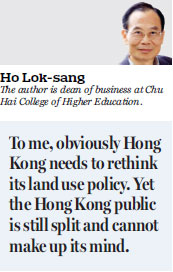Hong Kong should rethink its land policy
Updated: 2017-02-07 07:10
By Ho Lok-sang(HK Edition)
|
|||||||||
Ho Lok-sang argues that the SAR needs to find a proper balance between conservation and development in order to deal with the problems of having the world's most expensive housing prices
According to Demographia, Hong Kong has kept its ranking as the world's priciest home market for the seventh year.
Demographia infers affordability from the ratio of median apartment prices to the median gross annual household income. This "median multiple" is said to be recommended by the World Bank and the United Nations and is used by the Joint Center for Housing Studies, Harvard University as an indicator of housing affordability.
For all the authority alluded to, however, this multiple as a measure of affordability is flawed. The multiple, first of all, ignores differences in interest rates, which will make huge differences in terms of the mortgage payments that households pay when they service their loans. Second, the multiple ignores the differences in tax regimes across countries. Gross household incomes are pre-tax, but it is the after-tax incomes from which down-payments and mortgage payments are made. Since property taxes also vary a lot from country to country, an owner who lives in a country with high property taxes will have to pay a lot more on top of the mortgage installment payments than one that imposes much lower property taxes. If country A has a huge property tax that must be paid every year, while country B imposes a very light property tax, the price of a home in country A will be lower by the present value of the difference in property taxes paid.

Hong Kong's current mortgage rates are generally lower than those in most other places. In the US, where the 30-year fixed rate is the most popular, the current rate stands at about 4.2 percent. In Hong Kong, the typical mortgage rate is 2.15 percent. In Australia, the short-term rate is about 3.7 percent; on the mainland it is about 4.5 percent; in India it is over 9 percent; in Thailand it is about 12 percent. A loan of HK$1 million will require a monthly payment of HK$3,696 at 2 percent and HK$8,776 at 10 percent. The same loan is therefore much more affordable in Hong Kong than in India or Thailand.
Even for the same economy, the median multiple can be very misleading as an indicator of how affordability has changed over the years. Compared to the current rate of 4.2 percent, the historical average of the 30-year fixed rate mortgage in the US since 1971 is 8.2 percent. In 1981, it hit a high of almost 19 percent. Housing prices were of course depressed at such backbreaking interest rates, but paradoxically that is exactly because homes were unaffordable. By the same token, because our mortgage interest rates are low, carrying a mortgage loan is affordable, and that contributes to higher home prices than elsewhere.
Interestingly and most importantly, most households in Hong Kong with median incomes or lower are now living in very affordable public housing. The monthly income limit for a three-person household to be eligible for public housing application is HK$22,390 and HK$26,870 for an unrelated three-person elderly household. The median household income in Hong Kong stood at HK$26,000 in the third quarter of 2016. There is a long queue waiting for public housing today and presumably their incomes fall short of these limits. While many public housing tenants enjoy incomes above these limits and they are at no risk of being evicted, it remains true that 30 percent of Hong Kong's households live in low-cost public housing and that the majority of them have low incomes. I do not know of any city with a public housing program at this large scale.
Since the government is committed to housing those who are eligible for public housing, those Hong Kong people who have the motive to buy almost exclusively come from those whose incomes and assets are above the income and asset limits for application. Thus, it would appear that if a median multiple is to be meaningful, the median income should be the median income of those who do not qualify for public housing. If so, the relevant median household income must be well above the median household income for the entire population. This will significantly reduce the magnitude of the median multiple.
All this is not to say that we do not have a housing problem in Hong Kong. Hong Kong's homes are expensive, as they are in most other financial centers. Singapore, with its Housing Development Board homes targeted at close to 90 percent of its population, is indeed an exception. But those who envy Singapore's much cheaper housing have to consider the fact that Singapore has been aggressively reclaiming land in the past and has committed to doing the same in the next two decades at least. Singapore designated less than 10 percent of its total area for conservation. In Hong Kong over 40 percent of our land is designated as country parks subject to statutory protection and preservation. Singapore has a much smaller population than we do, but has a much bigger land area zoned for housing.
To me, obviously Hong Kong needs to rethink its land use policy. Yet the Hong Kong public is still split and cannot make up its mind. The truth is that we need to find the proper balance between conservation and development, and this balance has to be based on today's population and today's needs.
(HK Edition 02/07/2017 page8)